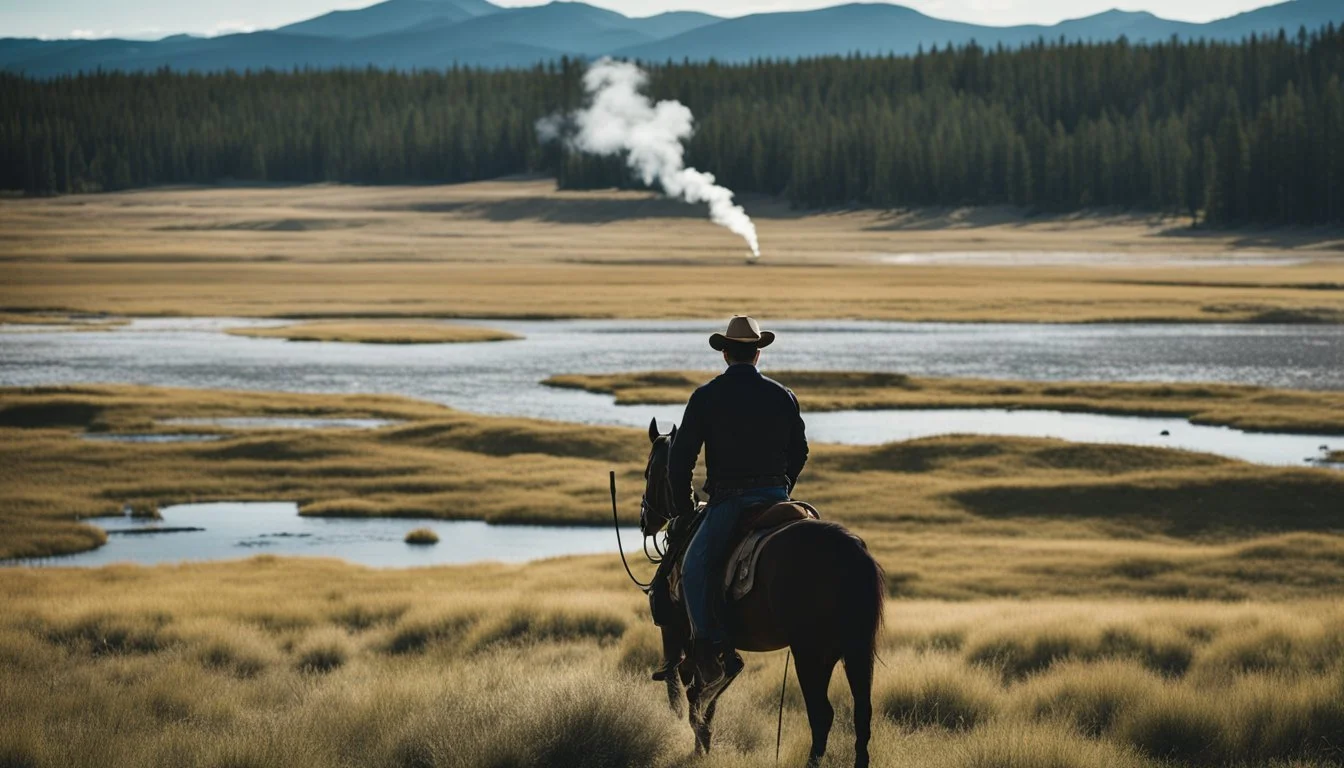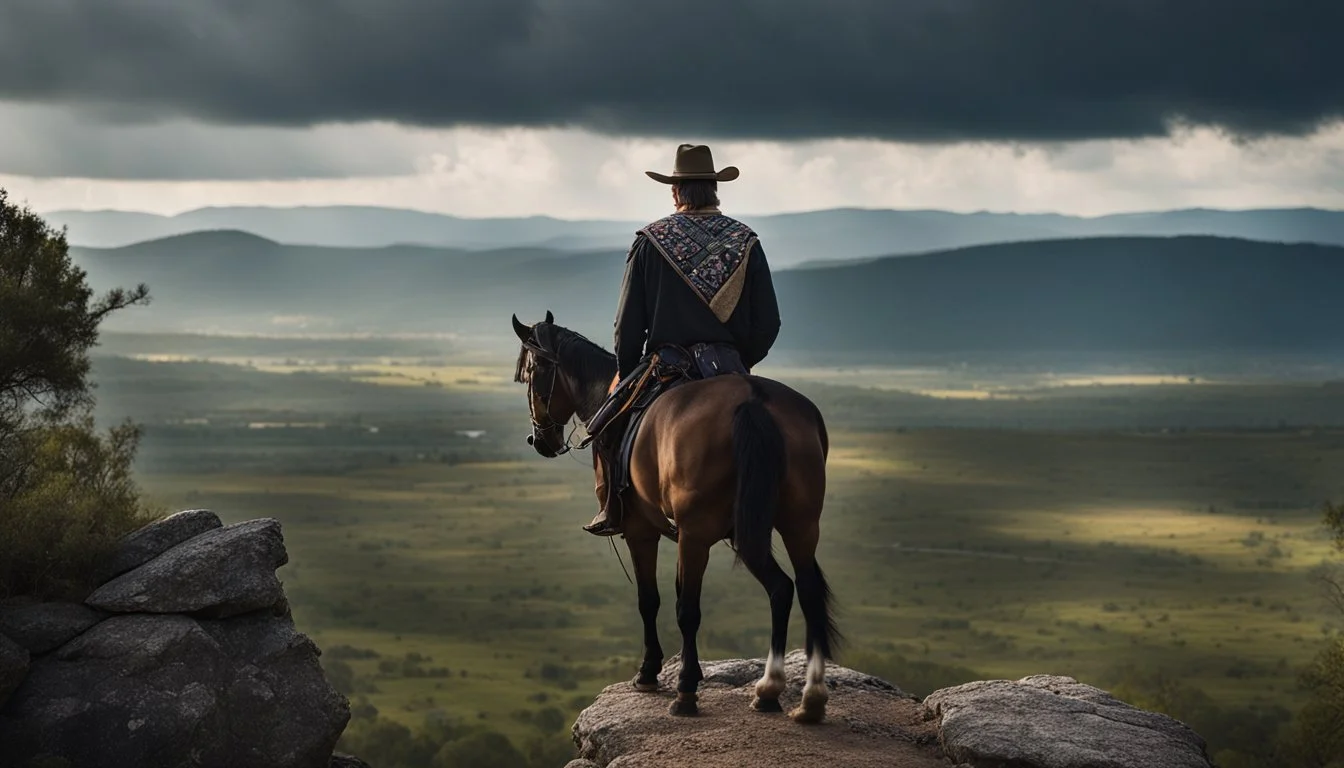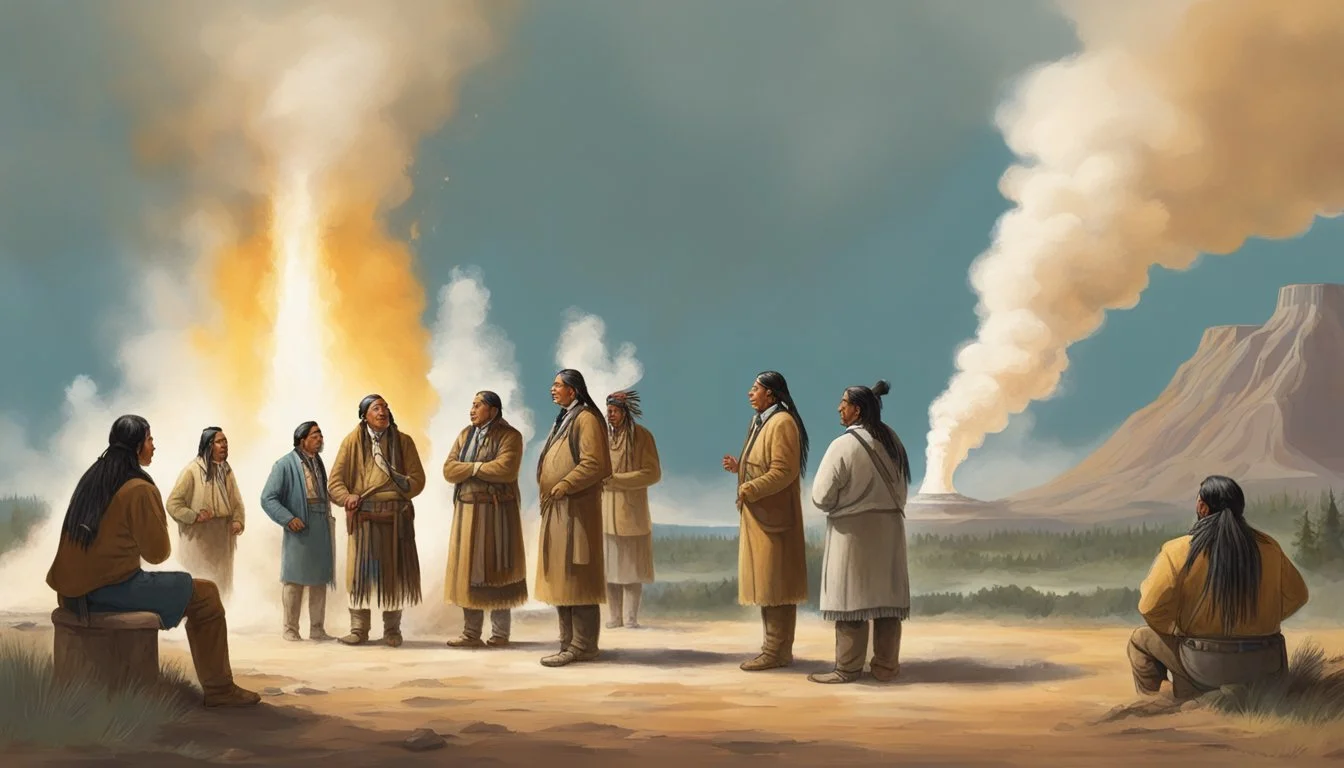Yellowstone's Thomas Rainwater on the Brink of Oil Discovery Chaos
Thomas Rainwater's leadership of the Broken Rock Reservation in Montana has been defined by his efforts to reclaim ancestral lands and protect Native American interests. The discovery of oil on reservation land would dramatically alter this dynamic, presenting both opportunities and challenges for the community.
If Rainwater found oil on the reservation, it could provide a significant economic boost, potentially funding vital services and infrastructure improvements for the Broken Rock people. This newfound wealth might strengthen their position in negotiations with neighboring entities like the Dutton Ranch, as seen in the Yellowstone series.
However, oil extraction often comes with environmental concerns that could conflict with traditional Native American values of land stewardship. Rainwater would face difficult decisions balancing economic development with cultural preservation and environmental protection. The presence of oil could also attract outside interests, potentially leading to increased conflicts over land use and resource rights in the region.
Historical Context of Broken Rock Reservation
The Broken Rock Reservation has a complex history shaped by significant events and treaties. These developments have profoundly impacted the Native American community residing on the reservation.
Significance of 1883 and 1923 in Reservation History
1883 marked a pivotal year for Broken Rock Reservation. A treaty established the reservation's boundaries, allocating land for Native American use. This agreement aimed to provide a designated territory for the tribe, but it also restricted their traditional lands.
1923 brought further changes to the reservation. A revised treaty altered the reservation's borders, often reducing its size. This adjustment reflected ongoing tensions between Native American rights and expanding settler populations.
These years highlight the evolving relationship between the U.S. government and Native American tribes. They demonstrate the shifting policies that have shaped life on Broken Rock Reservation over time.
The treaties of 1883 and 1923 continue to influence modern issues on the reservation. They form the legal basis for land rights, resource management, and tribal sovereignty discussions today.
Thomas Rainwater's Legacy and Leadership
Thomas Rainwater's tenure as chairman of the Broken Rock Reservation brought significant changes to the community. His leadership style combined traditional values with modern economic strategies, aiming to secure a prosperous future for his people.
Transformation Under Rainwater's Guidance
Thomas Rainwater initiated a series of reforms that reshaped the Broken Rock Reservation. He focused on strengthening tribal sovereignty and improving living conditions for residents. Under his leadership, the reservation saw upgrades to infrastructure, including new roads, housing developments, and improved water systems.
Rainwater also prioritized education, establishing scholarships for tribal youth and partnering with universities to create programs tailored to Native American studies. These efforts led to a rise in college graduation rates among tribal members.
His administration implemented job training programs, reducing unemployment on the reservation. Rainwater's policies aimed to create a self-sufficient community capable of thriving in the modern economy while preserving cultural traditions.
Vision for Economic Development
Rainwater's economic strategy centered on diversifying the reservation's income sources. He negotiated partnerships with renewable energy companies to develop solar and wind projects on tribal lands, creating jobs and generating revenue.
The chairman also spearheaded the establishment of a cultural tourism initiative, showcasing Broken Rock's rich heritage through guided tours, museums, and artisan markets. This approach not only boosted the local economy but also promoted cultural preservation.
Rainwater explored opportunities in sustainable agriculture, supporting small-scale farmers and launching a tribal-owned organic food brand. These ventures provided employment and strengthened food security within the community.
Stewardship of Tribal Lands
As a steward of tribal lands, Rainwater implemented strict environmental protection measures. He created a conservation department to monitor and maintain the reservation's natural resources.
The chairman fought against external threats to tribal lands, including legal battles to prevent encroachment by oil companies and other industrial interests. His efforts preserved sacred sites and ensured the continuation of traditional practices tied to the land.
Rainwater initiated reforestation projects and wildlife conservation programs, enhancing biodiversity on the reservation. He also established an educational center focused on teaching sustainable land management practices to future generations.
Oil Discovery on the Reservation
The discovery of oil on the Broken Rock Reservation would dramatically alter the landscape for Thomas Rainwater and his people. This potential development brings complex implications for tribal sovereignty, economic prospects, and environmental stewardship.
Implications for Sovereignty and Self-Determination
Oil discovery could strengthen the Broken Rock Reservation's position in negotiations with external entities. Increased financial resources may bolster legal efforts to protect tribal rights and lands. The tribe could gain leverage in dealings with state and federal governments.
However, outside interests may attempt to exploit the situation. Oil companies might pressure tribal leadership for access. This could lead to internal conflicts over resource management decisions. Rainwater would need to navigate carefully to maintain tribal unity and autonomy.
The tribe may face challenges in regulating extraction activities on their land. Developing robust governance structures becomes crucial to assert control over resources.
Economic Opportunities and Challenges
Oil production could generate significant revenue for the Broken Rock Reservation. Potential benefits include:
Funding for education, healthcare, and infrastructure
Job creation in extraction and related industries
Investments in tribal businesses and economic diversification
However, the "resource curse" poses risks. Overreliance on oil revenue can lead to economic instability. Proper financial management and diversification are essential.
The tribe may need to develop new skills and institutions to manage oil wealth effectively. This includes establishing sovereign wealth funds and negotiating fair contracts with energy companies.
Environmental Considerations
Oil extraction raises serious environmental concerns for the reservation. Potential impacts include:
Water pollution from drilling and spills
Air quality degradation
Habitat disruption for wildlife
These issues conflict with traditional Native American values of environmental stewardship. Rainwater would need to balance economic opportunities with protecting Mother Earth.
Implementing strict environmental regulations becomes crucial. The tribe could require companies to use best practices in extraction and remediation. Investing in renewable energy projects might offset some environmental impacts.
Impact on Relations with Yellowstone Dutton Ranch
The discovery of oil on the Broken Rock Reservation would dramatically alter the dynamics between Chief Thomas Rainwater and the Dutton family. This development could intensify existing tensions while also creating new opportunities for both parties.
Land Disputes and Historical Tensions
Oil discovery on reservation land would likely reignite long-standing territorial conflicts with the Yellowstone Dutton Ranch. John Dutton, played by Kevin Costner, has fiercely defended his family's property for generations. The prospect of valuable oil reserves adjacent to Dutton land could spark renewed legal battles and confrontations.
Historical grievances between Native Americans and ranching families like the Duttons would resurface. The Broken Rock tribe might view oil as a means to reclaim ancestral territories. This could lead to attempts to expand reservation boundaries, directly challenging Dutton Ranch borders.
Increased economic power for the reservation could shift the balance in ongoing disputes. Rainwater might leverage newfound resources to pursue land acquisitions or legal action against the Duttons.
Prospects for Cooperation or Conflict
Oil discovery presents potential for both collaboration and increased hostility between Rainwater and the Duttons. Shared infrastructure needs for oil extraction and transportation could necessitate cooperation. Joint ventures or agreements might emerge, offering economic benefits to both parties.
Conversely, competition for resources and influence could escalate existing rivalries. The Duttons might view Rainwater's increased power as a threat to their way of life. Environmental concerns related to oil drilling could create new points of contention, especially given John Dutton's commitment to preserving his land.
Negotiations over water rights, road access, and other shared resources would become more complex. The possibility of oil-related accidents or spills affecting Dutton property could further strain relations.
Cultural and Social Ramifications
The discovery of oil on the reservation would profoundly impact Broken Rock's cultural identity and social dynamics. It would create opportunities but also pose challenges to traditional ways of life.
The Role of the Native Community
The Native community would play a crucial role in decisions about oil development. Tribal leadership would need to balance economic benefits with cultural preservation. Community members might have diverse views on the issue.
Some would see oil as a path to prosperity and self-reliance. Others could worry about environmental damage and loss of traditional lands. The tribe would likely hold community meetings to discuss options.
Tribal elders might offer guidance on respecting sacred sites and maintaining cultural practices. Youth could voice concerns about future generations and sustainable development.
Preserving Cultural Identity Amidst Change
Oil discovery would test the tribe's ability to maintain its cultural identity. Traditional values of land stewardship might clash with resource extraction.
The influx of outside workers and money could alter reservation life. New businesses might open, changing the local economy. There could be pressure to modernize infrastructure and services.
Tribal leaders might create programs to teach language and customs to youth. They could require oil companies to fund cultural preservation efforts. The tribe might designate certain areas as off-limits to development to protect sacred sites.
Balancing progress with tradition would be an ongoing challenge. The community would need to find ways to embrace new opportunities while honoring their heritage as the land's original stewards.
Character Reactions and Dynamics
The discovery of oil on the reservation would dramatically shift the power dynamics between key Yellowstone characters. Family loyalties and personal ambitions would be tested as the stakes are raised.
Beth and Jamie Dutton's Strategic Moves
Beth Dutton would likely see the oil discovery as both a threat and an opportunity. She might attempt to negotiate deals with Rainwater to secure Dutton interests. Jamie could find himself caught between loyalty to his family and potential legal obligations to the state.
Beth may try to leverage her business acumen to outmaneuver Rainwater. Jamie's legal expertise could be crucial in navigating complex negotiations. Their sibling rivalry might intensify as they compete to prove their value to John Dutton.
Kayce Dutton's Perspective and Loyalties
Kayce's unique position as John Dutton's son and Monica's husband would be further complicated by the oil discovery. His ties to both the Dutton ranch and the reservation would create conflicting loyalties.
Kayce might try to mediate between the Duttons and Rainwater, seeking a compromise that benefits both sides. His military background and leadership skills could be valuable in managing potential conflicts. Kayce's relationship with Monica could face new challenges as tribal interests clash with Dutton ambitions.
Gil Birmingham's Portrayal of Rainwater
Gil Birmingham's nuanced portrayal of Thomas Rainwater would likely showcase the character's complex motivations. Rainwater might see the oil as a means to secure economic independence for his people.
Birmingham could depict Rainwater's internal struggle between personal power and tribal welfare. The actor might highlight Rainwater's strategic thinking as he navigates negotiations with the Duttons and outside interests.
Birmingham's performance could explore how the oil discovery impacts Rainwater's relationships with other characters, particularly John Dutton and Governor Perry.
Political and Legal Entanglements
Thomas Rainwater's oil discovery on the Broken Rock Reservation sparks a complex web of negotiations and legal battles. State and federal authorities scramble to assert control, while corporate interests circle the newfound resource.
Negotiations with State and Federal Authorities
The oil discovery triggers immediate talks between Rainwater and government officials. The Bureau of Indian Affairs steps in to oversee negotiations. State authorities push for a share of potential revenue.
Rainwater faces pressure to compromise on tribal sovereignty. He argues for full control over the resource. Environmental regulations become a key point of contention.
Legal experts debate the applicability of tribal laws versus federal statutes. The Attorney General's office gets involved, further complicating matters.
Market Equities and Corporate Pressure
Market Equities, already a powerful player in the region, intensifies efforts to gain access to the oil. They offer lucrative partnerships to the tribe. Rainwater remains cautious, wary of exploitation.
Corporate lobbyists flood the state capital. They push for legislation favorable to oil companies. This creates tension with environmental groups and local ranchers.
Market Equities considers legal action to challenge tribal control. They cite precedents from other reservations. Rainwater consults with top lawyers to fortify the tribe's position.
Inheritance tax implications for nearby landowners become a hot topic. This adds another layer to the already complex situation.
Future Outlook and Speculations
Thomas Rainwater's discovery of oil on the reservation could dramatically reshape the power dynamics in Yellowstone. This development opens up intriguing possibilities for future storylines and potential spinoffs.
Potential Storylines for Spinoffs and Continuations
The oil discovery could spark a new series focused on Rainwater's efforts to leverage this resource for his people's benefit. A spinoff might explore the challenges of balancing economic opportunities with environmental concerns and tribal traditions.
Paramount or Peacock could develop a show centered on the legal and political battles surrounding the oil rights. This could involve conflicts with state and federal governments, as well as rival energy companies.
A series set at the Four Sixes ranch might intertwine with Rainwater's story, exploring how the oil discovery impacts neighboring properties and the broader ranching community.
Writers could craft storylines about the societal changes within the reservation as newfound wealth flows in. This might include exploring themes of identity, modernization, and the preservation of cultural heritage.









